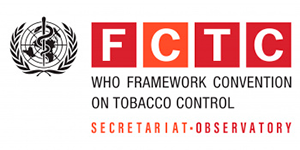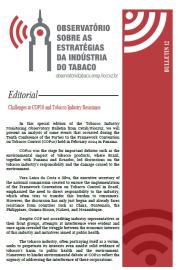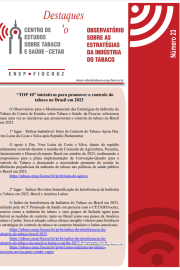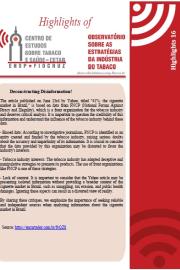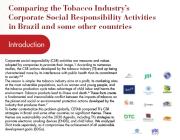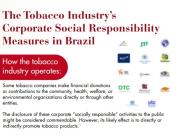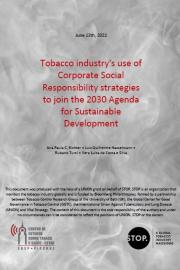Corporate social responsibility
Promote voluntary measures as an effective way of dealing with tobacco control and create a corporate image aimed at establishing partnerships to promote the health of the population that uses its products1.
Corporate Social Responsibility (CSR) (also called "Corporate Social Responsibility") refers to advertising campaigns to achieve social respectability by enhancing or changing the corporate image. This is often an exercise done by professionals who work with Public Relations, without necessarily making any objective changes to the company's policy.
CSR has been used in the last two decades by the chemical, tobacco and oil industries, among others. For example, there are oil companies that present themselves as "ecologically responsible", therefore being accused of practicing "greenwashing", that is, they disseminate wrong information to the population in order to ensure for themselves an image of an environmentally responsible company.2.
In the late 1990s, after the tobacco industry suffered major defeats in American courts, an agreement known as the Tobacco Master Settlement Agreement was signed, in which these transnational companies, after losing billions of dollars, began to adopt policies of CSR to improve your reputation. Since then, CSR has been used strategically to test and avoid government regulation aimed at reducing tobacco consumption, as well as proposing voluntary corporate governance agreements. Public Relations agencies such as KPMG play an important role in recommending and developing CSR strategies.
WHO: CSR of the Tobacco Industry is an Absolute Contradiction
CSR has been used by companies trying to improve their image. Although institutions such as the European Commission try to establish minimum standards for companies to be considered socially responsible 3 4 there is no consensus on these criteria. This gives the opportunity for any type of company to present itself as socially responsible, thus allowing even tobacco companies to develop CSR programs. It should be borne in mind that the consumption of tobacco industry products is one of the main causes of preventable deaths worldwide. According to Gary Fooks, in 2005, tobacco use killed an estimated 5.4 million people worldwide and will kill 8.3 million by 2030 as tobacco multinationals spread their epidemic smoke across developing countries.5 .
Since, under Brazilian law, the tobacco industry cannot advertise or promote its products, engaging in corporate social responsibility activities offers an alternative route to reaching various audiences. However, such activities may represent a violation of the Framework Convention on Tobacco Control. The guidelines referring to art. 5.3 are quite specific in this regard and set out the following:
* Guideline 26: The tobacco industry carries out activities described as socially responsible to detach its image from the lethal nature of the product it produces and sells or interfere with the establishment and implementation of public health policies. Activities that are described as "socially responsible" by the tobacco industry, seeking to promote tobacco consumption, are both a marketing and public relations strategy, which fall under the FCTC's definition of "advertising, promotion and sponsorship".
* Guideline 27: The corporate social responsibility of the tobacco industry is, according to WHO, an intrinsic contradiction, as the basic functions of the industry conflict with the goals of public health policies with regard to tobacco control. In the item "Recommendations", "Guideline 27" explains:
* Recommendation 6.1: The parties should ensure that all government agencies and the public are informed and made aware of the true purpose and scope of the activities described as "socially responsible" performed by the tobacco industry.
* Recommendation 6.2: Parties should not endorse, support, form partnerships or participate in tobacco industry activities described as "socially responsible".
* Recommendation 6.3: Parties should not allow public disclosure by the tobacco industry or anyone acting on its behalf of activities described as "socially responsible" or of expenditures represented by these activities, except where legally required to report such expenditures, such as in annual 6.
Engagement and Dialogue with Stakeholders
Under the guidance of consultants specialized in Public Relations (PR), the use of dialogue between a company and its main stakeholders has become a key strategy in PR. The argument is simple enough: if a business's operations can be seen as open and transparent, then such a business would not be suspected of having something to hide.
In the late 1990s, "Philip Morris" and "British American Tobacco" (BAT) began a series of stakeholder engagement meetings as part of an orchestrated campaign to reposition themselves as responsible tobacco companies789.
A few years later, BAT launched a website called BATresponsibility.eu to publicize the first cycle of BAT Social Reports in the European Union. It was the result of stakeholder consultations conducted by Pavel Telička, the former EU Commissioner responsible for Health and Consumer Protection issues between September 2006 and January 2007. BAT has periodically held further dialogue sessions, with the most recent in 2010 (In 2013, the site ceased to exist). The last one was organized by the auditing firm Bureau Veritas and, as a facilitator, Acona. The slogan: "CSR is about managing risk and opportunity".
A few years later, BAT launched a website called stakeholders as part of an orchestrated campaign to reposition themselves as responsible tobacco companies. A few years later, BAT launched a website called BATresponsibility.eu to highlight the first cycle of Reports demonstrating that they have become an EU Social Responsibilities company. This report was the result of stakeholder consultations facilitated by Pavel Telička, the former EU Commissioner responsible for Consumer and Health Protection issues between September 2006 and January 2007. BAT held regular dialogue sessions until 2010 and, in 2013 the website ceased to exist. The last session was organized by the auditing firm Bureau Veritas and the facilitator Acona and the slogan was: "CSR is about managing risks and opportunities"10.
Engaging in dialogue with stakeholders and adversaries can be a double-edged sword. Documents from the tobacco industry's internal archives already illustrate how it had been guided to use dialogue to break "confrontational postures" of special interest groups. In 2000, John Sharkey, who worked in the tobacco industry for 20 years, including at BAT, "Philip Morris" and "Japan Tobacco International" (JTI), advised his colleagues that the tobacco industry "should be seen as a listener, should be seen as trying to make things better and, above all, should engage in continued dialogue. Continued dialogue makes categorical opposition a much less easy stance to adopt, or at least appears much less sensitive and more political "11.
Divide and Rule
Sometimes the desire for openness and dialogue is a PR strategy that seeks to co-opt opposition, or to split it with the deliberate "divide and rule" strategy.
The "Tobacco Tactics" website page on "Project Sunrise", for example, shows that in 1996 Philip Morris developed a plan to "split opposition movements". Having studied 600 internal documents about the project, the researchers concluded that the company's intention was "to explicitly divide and conquer the tobacco control movement, by establishing relationships with those who considered organizations and individuals to be "moderate" in their claims." The tobacco industry has deliberately tried to position itself as a rational voice in the tobacco debate. Scholars maintain that "Philip Morris sought to disqualify some tobacco control advocates - those who rejected its partnership offer - by characterizing them as extremists."
Partnerships and Good Corporate Citizenship
Through partnerships with other organizations, tobacco companies try to build their reputation as good corporate citizens, involved in governance. Some of these partnerships have a direct link to a company policy on CSR. BAT, for example, is affiliated with the Institute of Business Ethics, a non-profit entity that encourages high standards of business behavior based on ethical values. The Institute helped the company develop policies on governance and transparency and with the publication of the BAT Social Report
With other partnership projects, the benefits for the tobacco industry are more indirect. Imperial Tobacco, for example, is one of the founders of the campaign established to encourage local individuals, companies or groups to clear their names. McDonald's and the Wrigley Company (fast food and chewing gum companies) are two other companies involved in "Love Where You Live". The fact that this campaign was mounted by three large waste producers can be interpreted as ''greenwashing''. The campaign is coordinated by Keep Britain Tidy, an environmental group with over 50 years of experience, while the Department for Environment, Food and Rural Affairs is the fifth partner. The cited page notes that government involvement effectively helping to position Imperial as "an engaged corporate citizen" can be considered a violation of the WHO Framework Convention on Tobacco Control.
philanthropy and sponsorship
Another way for companies to generate a sense of responsibility and zeal around their brand is to give money to worthy causes. As part of its CSR and PR programs, the tobacco industry has been 'philanthropic', embracing some longstanding causes. For example, an internal document (undated) produced by Philip Morris reveals that the company was committed to supporting projects in three areas: the arts, higher education and hunger/nutrition. The document demonstrates that "since 1968, Philip Morris has been among the most vigorous sponsors of the arts"12. No final dos anos 1990, a PM anunciou uma doação de 100 milhões de dólares para projetos de combate à fome 13.
Current donations
On its website, Philip Morris maintains that "more than 40 years ago, long before corporate social responsibility became fashionable, our predecessors at Philip Morris Co. donated money to causes they loved." There, five areas of activity can also be identified:
*Hunger and extreme poverty;
*Education;
* Living conditions in the countryside;
*domestic violence, and
*Disaster mitigation
Philip Morris has invested more than $30 million annually to support charitable causes around the world. In 2011, they supported 274 philanthropic projects in 58 countries. In total, they reached more than 3.5 million people.14.
British American Tobacco (BAT) says on its website that it recognizes the role of business as a "corporate citizen" and that its companies have long supported local charitable and community projects. They conceive of corporate social investment (CSI) as an end in itself rather than a form of promotion, and their companies have always identified closely with the communities in which they operate...Their global spend on CSI in 2011 was 13.6 million of pounds15.
Imperial Tobacco, in its annual report, says it has revised its approach to community investment to better focus on countries in need and those that matter most in terms of tobacco supply and business presence. They have allocated around £3m in investments.16.
Good Governance
Recent research by the Tobacco Control Research Group at the University of Bath demonstrates that British American Tobacco and Philip Morris are employing a wide range of CSR tactics to secure access to public officials, influence public policy making, disrupt opposing political coalitions, and rebuild the company's reputation, for example by providing reliable information through its website - as a voluntary self-regulatory platform.
Relevant Resources
Offer support for people who want to quit smoking as a CSR strategy
A very cynical example of good corporate citizenship and hiring independent experts was the PM's funding of a research center that helped people stop smoking at Duke University in the USA (QuitAssist Initiative by Phillip Morris). In addition, the industry presents the discourse of responsibility towards public health, when it promotes "reduced risk" cigarettes17, with lower rates of tar and other tobacco products, reinforcing that they produce a reduction in the harmful effects of smoking, although this premise has not been scientifically proven.
* See: Duke University and the Tobacco Industry.
Boosting the reputation
In May 2011, the University of Durham in the UK came under fire for accepting a grant of 472,000 reais from British American Tobacco (BAT) to fund "Chancellor's Scholarships" for Afghan women. The scholarships were intended for female graduates of the University of Kabul who came to that university for postgraduate studies for five years.
*See: Targeting Women and Girls
*See: Institute of Business Ethics
*See: Project Sunrise
*See: CSR: Imperial and Love Where You Live
CSR tactics in Brazil
As we have already seen, the use of the Corporate Social Responsibility argument has been widely used by the tobacco industry internationally.
However, therein lies a seemingly unsolvable problem: '''tobacco products are lethal''' when used as recommended, and there is no way any volume of CSR initiatives can resolve this fundamental contradiction, which comes into play. clash with any ethic of corporate citizenship worthy of the name.
Thus, only the absence of more in-depth ethical discussions about what could define a company's corporate social responsibility could make the tobacco industry define itself as a corporate citizen.
"Instead of a broad social debate, we have watched Souza Cruz and other subsidiaries of British American Tobacco actively guide the debate and move towards convincing society, NGOs, reference institutes on the subject, among others, that there is no problem in relating CSR with the manufacture and commercialization of a product that causes illness, death and a series of social, environmental and economic impacts."18.
Asked about the possibility of a company that manufactures cigarettes being socially responsible, given the notorious damage to health caused by them, the then manager of planning for corporate affairs at Souza Cruz, José Roberto Cosmo, said:
"Corporate Social Responsibility is linked to the way of managing and not to the product itself. I do not know of a definition of CSR that works primarily on the product. It may exist. It concerns the way the company manages its business and not the problems that the product entails. And also the way in which the company is managing its impacts on society".
19.
Regarding the responsibility that the company should have in the field of health, the answer given by Souza Cruz is always the same:
"We cannot meet demands in the health area, because it is the State's duty, the company pays taxes. The State is there to take care of public health".20
In this regard, see also:
* Media tactics
* Advertising and marketing tactics
* Online tactics
* Educational tactics
- 1. WORLD HEALTH ORGANIZATION. Tobacco industry interference with tobacco control, 2008. Disponível em: http://whqlibdoc.who.int/publications/2008/9789241597340_eng.pdf?ua=1 http://whqlibdoc.who.int/publications/2008/9789241597340_eng.pdf?ua=1. Acesso em:24 out. 2014. Documento integral em PDF: https://drive.google.com/file/d/0B0HvJttn0WXDVmJCX0RPM3ZQWnM/view?usp=sh....
- 2. Nota: Concise English Dictionary, Definição de "Greenwash", 10th Edition, 1999.
- 3. COMISSION OF EUROPEAN COMMUNITIES. Green Paper, Brussels, 18 jul. 2001. Disponível em: http://eur-lex.europa.eu/LexUriServ/LexUriServ.do?uri=COM:2001:0366:FIN:... Promoting a European framework for Corporate Social Responsibility. Acesso em: abr. 2012. Documento integral em PDF: https://drive.google.com/file/d/0B0HvJttn0WXDNVdLSVhUUDc0UE0/view?usp=sh....
- 4. IMPLEMENTING the Partnership for Growth and Jobs: Making Europe a Pole of Excellence on Corporate Social Responsibility. Commission of the European Communities, Brussles, 22 mar. 2006. Disponível em: http://eur-lex.europa.eu/LexUriServ/LexUriServ.do?uri=COM:2006:0136:FIN:... http://eur-lex.europa.eu/LexUriServ/LexUriServ.do?uri=COM:2006:0136:FIN:.... Acesso em: 6 nov. 2014. Documento integral em PDF: https://drive.google.com/file/d/0B0HvJttn0WXDUnZ3MUN3anAwNW8/view?usp=sh....
- 5. FOOKS, Gary. The limits of corporate social responsibility: Techniques of neutralisation, stakeholder management and political CSR. Journal of Business Ethics, 2 mar. 2012. Disponível em: http://www.ncbi.nlm.nih.gov/pmc/articles/PMC3755635/ The limits of corporate social responsibility: Techniques of neutralisation, stakeholder management and political CSR. Acesso em: 6 nov. 2014. Documento integral em PDF: https://drive.google.com/file/d/0B0HvJttn0WXDbnRzODhQMFRyc0k/view?usp=sh....
- 6. WORLD HEALTH ORGANISATION. Guidelines for implementation of Article 5.3 of the WHO Framework Convention on Tobacco Control: on the protection of public health policies with respect to tobacco control from commercial and other vested interests of the tobacco industry. 2008. Disponível em: http://www.who.int/fctc/guidelines/article_5_3.pdf. Acesso em: 6 nov. 2014. Documento integral em PDF: https://drive.google.com/file/d/0B0HvJttn0WXDV3otOFVFTjBIQmc/view?usp=sh....
- 7. REPORT regarding details of project. British American Tobacco, Inglaterra, 15 nov. 1999. Disponível em: http://legacy.library.ucsf.edu/tid/eyb04a99/pdf. Acesso em: 22 mai. 2015. Documento integral em PDF: https://drive.google.com/file/d/0B4ivOg72nORyY0xzZVdjb3J2QzQ/view?usp=sh...
- 8. STAKEHOLDER Planning & Development Manger. British American Tobacco, Inglaterra, 6 set. 2005. Disponível em: http://legacy.library.ucsf.edu/tid/quc14a99/pdf. Acesso em: 22 mai. 2015. Documento integral em PDF: https://drive.google.com/file/d/0B4ivOg72nORyb2dSQi1DSTd1cFk/view?usp=sh...
- 9. PHILIP Morris Calls for Constructive Dialogue - "It's Time to Talk". Philip Morris, Estados Unidos, 13 out. 1999. Disponível em: http://legacy.library.ucsf.edu/tid/dbh60a99/pdf. Acesso em: 22 mai. 2015. Documento integral em PDF: https://drive.google.com/file/d/0B4ivOg72nORycEtKZEJaYTEwX0U/view?usp=sh....
- 10. STAKEHOLDER dialogue. BAT, Inglaterra, 2010. [o site ficou fora do ar em 2012]. Disponível em: http://web.archive.org/web/20120417192043/http://www.batresponsibility.e.... Acesso em: 27 jan. 2015. Documento integral em PDF: https://drive.google.com/file/d/0B0HvJttn0WXDbk1aeEhZN3FlblU/view?usp=sh....
- 11. SHARKEY, John. Tobacco industry's response to the new social and legal environment. Legacy Tobacco Documents Library, Brussels, 26 ago. 2000. Disponível em: http://legacy.library.ucsf.edu/tid/zwm10c00/pdf http://legacy.library.ucsf.edu/tid/zwm10c00/pdf. Acesso em: 6 nov. 2014. Documento integral em PDF: https://drive.google.com/file/d/0B0HvJttn0WXDaldKT1VnQzZMQlE/view?usp=sh....
- 12. PHILIP Morris companies inc.: corporate philanthropy. Legacy Tobacco Documents Library, Estados Unidos, 17 set. 2009. Disponível em: http://legacy.library.ucsf.edu/tid/qex76b00/pdf http://legacy.library.ucsf.edu/tid/qex76b00/pdf. Acesso em: 6 nov. 2014. Documento integral em PDF: https://drive.google.com/file/d/0B0HvJttn0WXDRFpqMmRXUFNFd0E/view?usp=sh....
- 13. HYATT, James. Corporate giving: Philip Morris launches $100M anti-hunger drive. Legacy Tobacco Documents Library, Estados Unidos, 15 fev. 2002. Disponível em: http://legacy.library.ucsf.edu/tid/hzb60d00. Acesso em: 7 nov. 2014. Documento integral em PDF: https://drive.google.com/file/d/0B0HvJttn0WXDU0lINDN3NHZBUEU/view?usp=sh....
- 14. OUR charitable giving program. Philip Morris International, Estados Unidos, [s.d.]. Disponível em: http://www.pmi.com/eng/about_us/charitable_giving/pages/charitable_givin... http://www.pmi.com/eng/about_us/charitable_giving/pages/charitable_givin.... Acesso em:7 nov. 2014. Documento integral em PDF: https://drive.google.com/file/d/0B0HvJttn0WXDS0U4MmFXRENCOVU/view?usp=sh....
- 15. CORPORATE social investment. British American Tobacco, Inglaterra, 9 ago. 2008. Disponível em: http://www.batme.com/group/sites/BAT_86XECK.nsf/vwPagesWebLive/DO87MEC7?... http://www.batme.com/group/sites/BAT_86XECK.nsf/vwPagesWebLive/DO87MEC7?.... Acesso em:7 nov. 2014. Documento integral em PDF: https://drive.google.com/file/d/0B0HvJttn0WXDUlVqNHpITl93ekU/view?usp=sh....
- 16. REALISING our potential. Imperial Tobacco, Inglaterra, 201. Disponível em: http://www.imperial-tobacco.com/files/financial/reports/ar2011/files/pdf... http://www.imperial-tobacco.com/files/financial/reports/ar2011/files/pdf.... Acesso em: 7 nov. 2014. Documento integral em PDF: https://drive.google.com/file/d/0B0HvJttn0WXDZUFEQzROVEZvaVU/view?usp=sh....
- 17. [sobre a questionável ausência de problemas nos cigarros de “risco reduzido”]. Treatobacco, Estados Unidos, 21 out. 2014. Disponível em: http://www.treatobacco.net/pg/page_71.php. Acesso em: 26 jan. 2015. Documento integral em PDF: https://drive.google.com/file/d/0B0HvJttn0WXDLXl3QXhBNUdSaG8/view?usp=sh....
- 18. RESPONSABILIDADE social empresarial: a nova face da indústria do tabaco. ACT, 2005. Disponível em: http://actbr.org.br/uploads/conteudo/50_662_PUBLICACAO_RSE.pdf http://actbr.org.br/uploads/conteudo/50_662_PUBLICACAO_RSE.pdf. Acesso em: 20 out. 2014. Documento integral em PDF: https://drive.google.com/file/d/0B0HvJttn0WXDVVI3SlR5X1RPV28/view?usp=sh....
- 19. Op.cit.
- 20. Op.cit.

